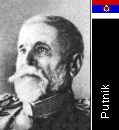Putnik
WWI Document Archive > Alphabetical Index of WWI Biographies > P-Index > Putnik
Putnik, Radomir Field Marshall. (1847-1917). Born at Kraguyevats, Serbia
He began his military career against the Turks in 1876-77 and, after the war against the Bulgarians in 1889, he was appointed deputy-chief of the Serbian General Staff. He also held a post on the faculty of the Military Academy.
His career then became subject to the vagaries of Serbian political intrigues. In early 1903, he was placed on the retired list due to his falling out of favor with the Serbian monarchy. Later in the year, however, a military revolt resulted in his being promoted to the rank of General and appointed Chief of the General Staff. In 1906 he assumed the additional post of Minister of War. He was appointed voivode (field-marshall) in 1912, the first person to hold this title, and presided over the Serbian army's victories over Turkey and Bulgaria in the First and Second Balkan Wars of 1912-1913.
After the Second Balkan War, Putnik's health broke down. The outbreak of the war found him 'taking the cure' at an Austrian spa where he was taken into custody by Austrian police. However, in a gesture of misplaced chivalry, Emperor Franz Joseph himself ordered Putnik's release.
Putnik's health was impaired to the point that he had to spend most of his time in a well-heated room. Yet this did not prevent him from assuming command of his country's army. He master-minded Serbia's defeat of the Austrian invasions of August and September, 1914 and in December of that year drove the Austrian army completely out of Serbia.
The Balkan Front was quiet until November, 1915 when von Mackenson led a combined force of Germans, Austrians and Bulgarians in a final invasion of the upstart Serbia. Short on ammunition and other supplies, Putnik and his army were helpless under the Central Powers' onslaught. Putnik joined the retreat of the Serbian army across mountainous Albania to Corfu in the winter of 1915-1916. Once a government-in-exile was formed on Corfu, however, Putnik found himself yet again placed on the retired list. This was truly his retirement; he died in Nice in May, 1917.
Radomir Putnik was perhaps the most distinguished soldier in Serbia's history. He was a natural strategist and tactician, a rarity in the late-19th and early-20th centuries, who failed on only one occasion to defeat his country's enemies.
WWI Document Archive > Alphabetical Index of WWI Biographies > P-Index > Putnik

